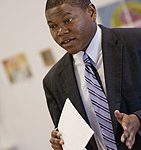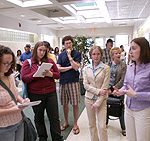Elon students had an opportunity to share their research with peers, faculty and other members of the campus community April 5 during the 13th annual Student Undergraduate Research Forum (SURF). Details...
 Close to 140 students presented posters, PowerPoint presentations and experiments representing a variety of academic disciplines, including political science, psychology, biology and computer science. In addition to introducing students to scholarly research work, SURF gives students the opportunity to have their findings presented at national conferences and published in academic journals.
Close to 140 students presented posters, PowerPoint presentations and experiments representing a variety of academic disciplines, including political science, psychology, biology and computer science. In addition to introducing students to scholarly research work, SURF gives students the opportunity to have their findings presented at national conferences and published in academic journals.
John Penniman examined the politics involved in reconciliation during his presentation. Under the direction of faculty mentor Jeffrey Pugh, professor of religious studies, Penniman developed a theological critique of the rhetoric of war and peace. He also aimed to define reconciliation.
“Reconciliation can be seen as harmony between peoples,” Penniman said. “Reconciliation (also) exists as a view, a theoretical framework of the world.” Penniman believes the earliest teachings of the church have been misinterpreted in today’s society, producing a good vs. evil mentality that he says was not the original intent of the church.
Zachary Lauritzen’s work centered on the factors that play a role in the ways nations decide to respond to terrorism. He hypothesized that a country would be more likely to respond with war or some other active measure if a terrorist attack was severe or took place within its borders.
Studying the 2004 Madrid train bombings and the 1998 attacks on U.S. embassies in Africa, Lauritzen “found the inverse of this to be true. In Spain, the public did not want a war, so as a result of the attacks, Spain pulled its troops out of Iraq.” On the other hand, U.S. citizens favored a military response in the wake of the embassy bombings, even though the attacks resulted in a relatively low number of American casualties and did not take place at home. Lauritzen said his research revealed that other factors could also play a role in deciding how a country responds, including the timing of elections, the historical success of past responses, and state leaders and their beliefs.
Beyond what he learned from his research, Lauritzen said participating in SURF is something he’s glad he got to do in his senior year.
“Doing SURF was something I expected to do. I was able to say I produced something that was more than just a paper,” said Lauritzen, who worked with Laura Roselle, associate professor of political science. “What I liked was being able to tap in to a professor and what they’re interested in. That’s when you get really good material. SURF also helped me make connections between many of the classes I’ve taken at Elon. When you can connect one class to the next, that’s special.”
Darris Means’ research examined social interactions between white and black students at Elon. He surveyed 200 students and found that perceptions of race relations differed by race and gender. For example, Means’ research showed that while 40.7 percent of white males have a positive perception of race relations, the number falls to 14.3 percent for black females.
“I think it’s important to recognize the different perceptions that black students and white students may have in race relations,” said Means, who did his research under the direction of sociology professor Tom Henricks.
Through his research, Means found that students who live on campus are more likely to interact with people outside their race, and that blacks are more likely than whites to dine with someone of a different race on a regular basis. He is continuing his research this semester through open-ended interviews and observations of behaviors and attitudes.
 Many students presented their work during a poster session Tuesday afternoon in the Koury Center concourse. The day started with a special College Coffee at Fonville Fountain celebrating SURF. An invitation-only student achievement awards ceremony, as well as senior showcase galas featuring vocal and instrumental performances rounded out the day.
Many students presented their work during a poster session Tuesday afternoon in the Koury Center concourse. The day started with a special College Coffee at Fonville Fountain celebrating SURF. An invitation-only student achievement awards ceremony, as well as senior showcase galas featuring vocal and instrumental performances rounded out the day.
For more information about the SURF program, visit the link below:


